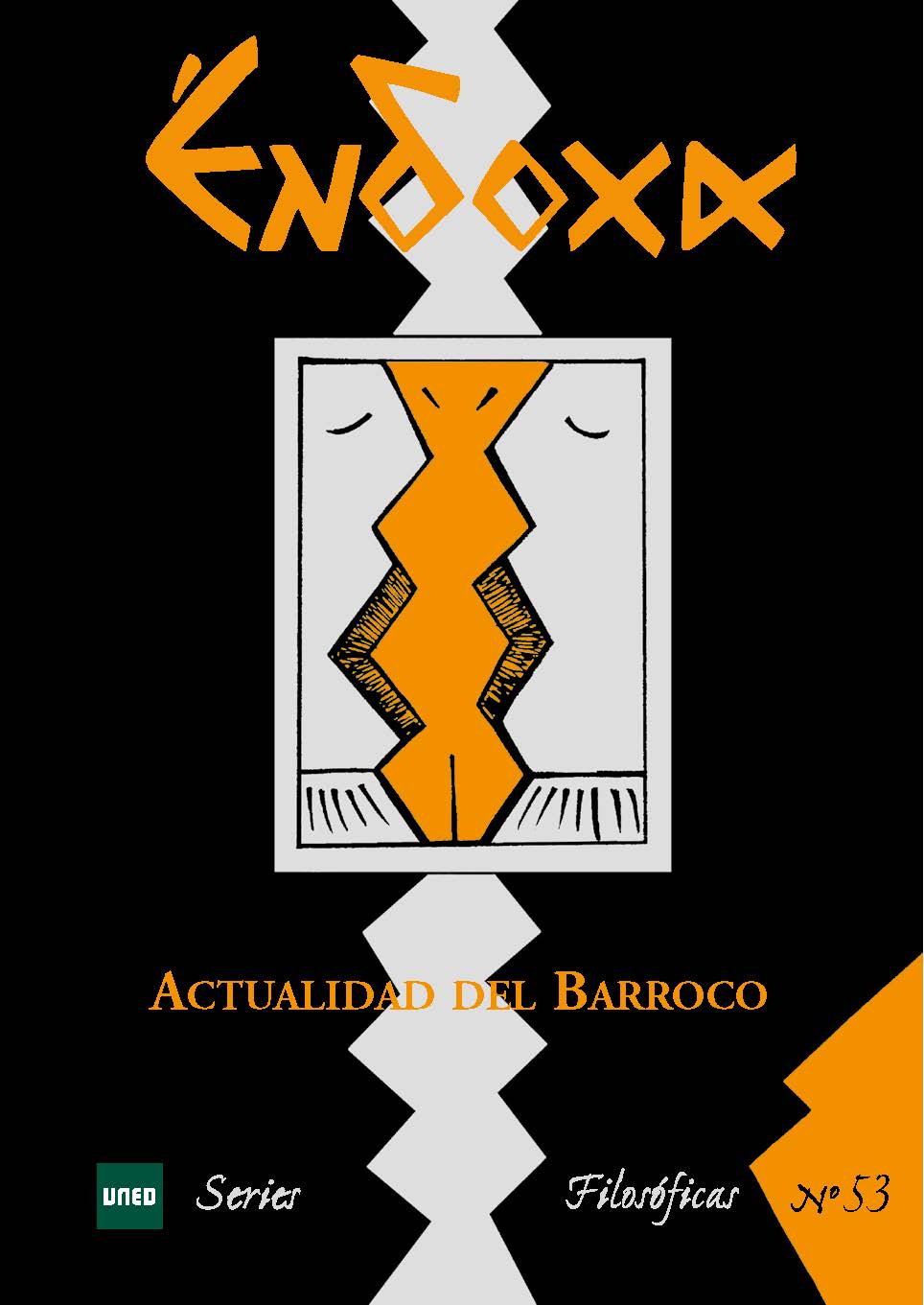TIME AND CARE. HERITAGE, CONTINUATIONS AND DIVERGENCES BETWEEN THE HISPANIC BAROQUE AND SOME CURRENT READINGS
DOI:
https://doi.org/10.5944/endoxa.53.2024.37775Keywords:
Gracián, M. Heidegger, P. Sloterdijk, World, Care, EthosAbstract
This paper aims to compare certain notions of care: on one hand, the function of care as element of baroque subjectivity in Baltasar Gracián; on the other hand, the characterisation and link between worldand ethos, notions reflected from Heidegger and Sloterdijk. Assuming the divergences of eras, it is intended nonetheless to examine the shared conditions of this care as a constituent of the subject and its world. This reading could offer another link between us and the Modern Age: instead of paying attention at the emergence of the subject itself, rethinking the conditions of an ethic subject installed in its own world.
Downloads
References
AYALA MARTÍNEZ, J. M. (2001). «“Vivir a la ocasión”. El casuismo y la prudencia en Baltasar Gracián», Ínsula. Revista de letras y ciencias humanas, 6-9, 655-656.
CAPELLE-DUMONT, P. (2012). Filosofía y teología en el pensamiento de Martin Heidegger. Buenos Aires: Argentina.
CEREZO GALÁN, P. (2015). El héroe de luto. Ensayos sobre el pensamiento de Baltasar Gracián. Zaragoza: IFC.
COURTINE, J.-F. (1990). Heidegger et la phénoménologie. Paris, Vrin.
DE LA FLOR, F. (1993). «La organización retórica de “El Comulgatorio”». Documentos A: Genealogía científica de la cultura, 5, 139-149.
— (2002). Barroco. Representación e ideología en el mundo hispánico (1580-1680).
DE LA HIGUERA, J. (2003). «Lo insoportable de la verdad», en El mundo de Baltasar Gracián. Filosofía y literatura en el Barroco. Granada: EUG, 303-342.
D’ORS, E. (1993). Lo barroco. Madrid: Tecnos.
GARCÍA GIBERT, J. (2004). «El ficcionalismo barroco en Baltasar Gracián», en: GRANDE, M. Y PINILLA, R. (eds.) Gracián: Barroco y Modernidad. Madrid: Universidad Pontificia de Comillas, 69-101.
GRACIÁN, B. (1669). El Comulgatorio. Amberes: Gerónimo y Verdussen.
— (2005). Oráculo manual y arte de prudencia. Madrid: Cátedra.
— (2019). El Criticón. Madrid: Cátedra.
HEIDEGGER. M. (2001a). Caminos de bosque. Madrid: Alianza.
— (2001b). Conferencias y artículos. Barcelona: Serbal.
— (2003). Ser y tiempo. Madrid: Trotta.
— (2007). Hitos. Madrid: Alianza.
— (2008). Ontología. Hermenéutica de la facticidad. Madrid: Alianza.
— (2013). Nietzsche. Barcelona: Ariel.
JIMÉNEZ VILLAR, B. (2022a). «Alegorías de lo extraordinario en Baltasar Gracián». Pensamiento. Revista De Investigación E Información Filosófica, 78 (300 Extra), 1283-1302.
— (2022b). «Gracián y la modernidad: la indisponibilidad del mundo y el papel constituyente de los otros como claves de la virtud». Hipogrifo, 10.2, 111-126.
ROSSET, C. (1974). La anti naturaleza. Madrid: Taurus.
PELEGRÍN, B. (1985). Éthique et esthétique du baroque. L’espace jésuitique de Baltasar
Gracián. Arles : Actes Sud.
— (2023). «Tiempo, relato y escritura novelesca en “El Criticón”». Arte Nuevo. Revista De Estudios Áureos, 10, 158–174.
PÖGGELER, O. (1992). Neue Weg mit Heidegger. München: Alber.
RAHNER, K. (1961). Escritos de Teología, III. Madrid: Taurus, 1961, pp. 313-330.
SÁEZ RUEDA, L. (2022). «Verdad y diferencia en el Barroco hispano como “modernidad-otra”». Pensamiento. Revista De Investigación E Información Filosófica, 78 (300 Extra), 1259-1282.
SLOTERDIJK, P. (2007). En el mundo interior del capital: para una teoría filosófica de la
globalización. Madrid: Siruela.
— (2011). Sin salvación. Tras las huellas de Heidegger. Madrid: Akal.
— (2012). Has de cambiar tu vida. Valencia: Pre-Textos.
Downloads
Published
How to Cite
Issue
Section
License

This work is licensed under a Creative Commons Attribution-NonCommercial-NoDerivatives 4.0 International License.
The authors who publish in this journal must agree to the following terms:
- The authors hold author’s rights and guarantee the journal the right to be the first to publish the work as well as the Creative Commons Attribution License which allows others to share the work as long as they acknowledge the authorship of the work and its initial publication in this journal.
- The authors can establish, on their own, additional agreements for the non-exclusive distribution of the version of the work published in the journal (for example, placing it in an institutional repository or publishing it in a book), always acknowledging the initial publication in this journal.
- The authors are allowed and encouraged to disseminate their work electronically (for example, in institutional repositories or on their own webpages) before and during the submission process, as this can give rise to productive exchanges, as well as earlier and increased citing of the works published (See The Effect of Open Access).








